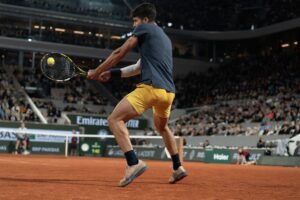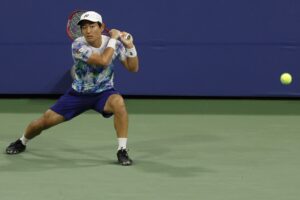In 1965, 52 years ago, Sandy Koufax changed the face and attitude of American Judaism when he refused to pitch on Yom Kippur, the holiest day of the Jewish year. For Israeli Dudi Sela, who comes from a country and a culture where Yom Kippur is respected by the vast majority of even the least religious of Jews, choosing not to play on the holiest of Jewish (and Israeli) days will probably not be remembered as nearly the same landmark decision.
Sela was competing in the ATP 250 tournament this week in Shenzhen, China. Sela reached the quarterfinals by defeating qualifier Matthew Ebden in the first round, then upsetting third-seed Mischa Zverev in the second round. The four quarterfinal matches were to be played on Friday, September 29th, with the opening match called for 2 PM local time. Sela was scheduled to play second, against fifth seed Alexandr Dolgopolov.
Yom Kippur starts at sunset, which locally in Shenzhen was 6:12 PM today. Four hours to play two best-of-three set tennis matches is doable, but not always easy. When the day’s opening match (Henri Laaksonen vs Zhizhen Zhang) went three sets and lasted over two hours, it seemed clear that Sela’s match would not likely finish before sunset, and certainly not if it went three sets.
Dolgopolov took the first set 63. Sela fought back to win the second set, and played one game in the third set. Then, with just minutes remaining until sunset, Sela retired from the match.
The decision of the tournament to put Sela on court second seems troubling. Yes, they gave him enough time that in most cases, the match could finish. But there was little to lose by not putting his match on first, which he had requested. He and Dolgopolov are certainly bigger names than Laaksonen and Zhang, but none of the players are particularly well-known or well-watched. Maybe the tournament wanted the Chinese Zhang up first to draw fans to the opening match, but he is the sixth-ranked Chinese player, barely inside the World’s top 500.
This is not the first time that Israel has had a problem with Yom Kippur and tennis. In 2013, the third set of Davis Cup ties of the year was scheduled to take place over the weekend that included Yom Kippur (the tie went from Friday-Sunday, and Yom Kippur was Saturday). Israel requested that Belgium accommodate its religious requests, but the Belgian tennis federation refused. The ITF intervened and pushed the matches off one day, so that the tie was played on Friday, Sunday, and Monday–but they also fined the Israeli tennis federation $13000 to make up for Belgium’s troubles in competing an extra day.
Maybe Sela can be questioned for choosing to play this week at all, but that seems like a weak point. Sela is a career journeyman who has reached the latter stages of some small ATP tournaments (he is 0-2 in career finals), and he doesn’t often upset better players to reach later rounds. Also, this tournament has matches early enough on Friday that if he made the quarterfinals, he could reasonably expect to get an early match. If he had reached the semifinals on Saturday, the second match takes place late enough that he could compete (though it is unlikely that he would have been granted the night match). Sela still remains in the doubles draw, and his semifinal match is scheduled for 6:45 PM, which is over half an hour after sunset.
Sela also did everything right vis-a-vis the fans. Even when it became clear that he could not win the match in time–that was obvious as soon as he lost the first set–he played until as late as he could and gave the fans what they paid to see. This is Sela’s livelihood. He did everything he could to make it work for his religion, and when it didn’t work out, he gave up playing in favor of his religion. It might not be as shocking, as meaningful, or become as well-known as Koufax’s moment over 50 years ago, but it is one that Israelis and Jews around the world will acknowledge and appreciate just the same.
Main Photo:
Embed from Getty Images






